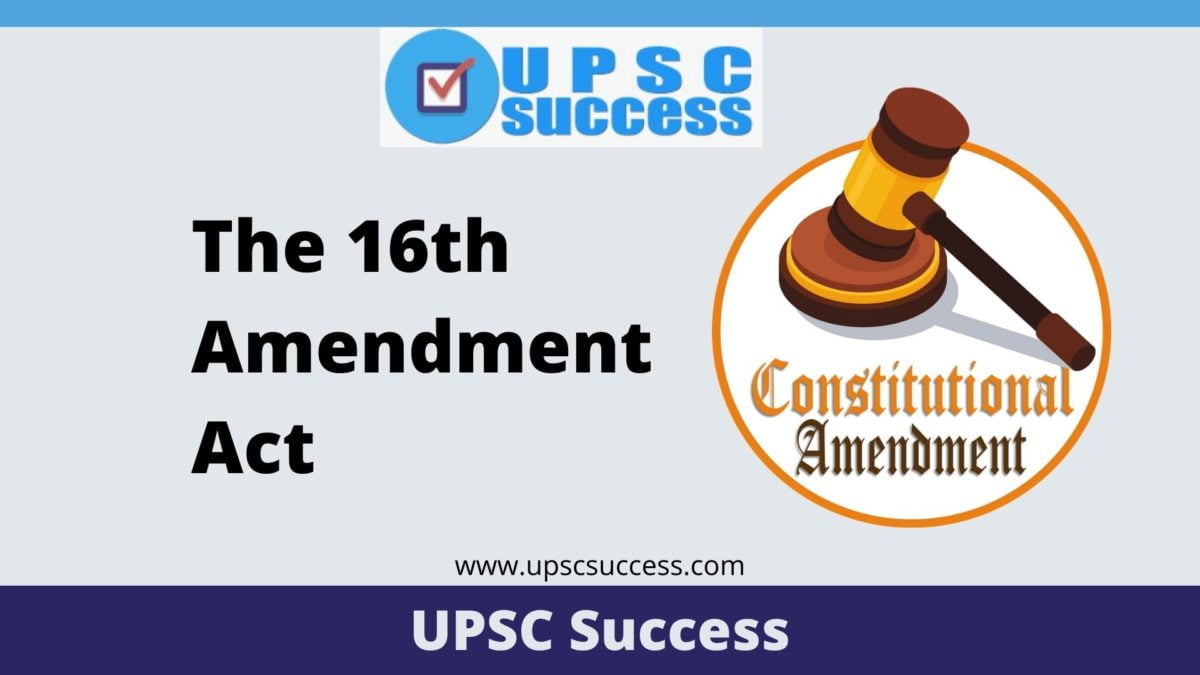The Sixteenth Amendment Act of 1963 has two provisions as follows: Empowered the state to impose further restrictions on the rights to freedom of speech and expression, to assemble peacefully and to form associations in the interests of sovereignty and integrity of India.
Out of all ten forms, except the Form of oath of secrecy for a Minister for the Union and the Form of oath of secrecy for a Minister for a State the following eight forms of oath or affirmation were amended in the Third Schedule by the Sixteenth Constitutional Amendment Act,1963:
- Form of oath of office for a Minister for the Union;
- Form of oath or affirmation to be made by a candidate for election to Parliament;
- Form of oath or affirmation to be made by a member of Parliament;
- Form of oath or affirmation to be made by the Judges of the Supreme Court and the Comptroller and Auditor-General of India;
- Form of oath of office for a Minister for a State;
- Form of oath or affirmation to be made by a candidate for election to the Legislature of a State;
- Form of oath or affirmation to be made by a member of the Legislature of a State; and
- Form of oath or affirmation to be made by the Judges of a High Court.
The Background
The southern political party Dravida Munnetra Kazhagam (DMK) in the state of Madras, which earlier had advocated the secession of parts of the south and the creation of a separate nation-state called ‘Dravida Nadu’ or ‘Tamilnadu’, had scaled back its demands for secession during the outbreak of war with China in 1962.
In January 1961, the Congress party at its Bhavnagar session had set up a ‘Committee of National Integration and Regionalism’, under the chairmanship of C.P. Ramaswami Aiyar, to study separatist movements that were prevalent in India and were supposed to report on ways to neutralise them.
Prime Minister Nehru had called a meeting of the chief ministers in August 1961, where it was recommended that advocacy of secession be made a criminal offence. In September 1961, a National Integration Conference was convened. The committee submitted its report to the Prime Minister on 5th November 1962.
It made recommended that Article 19 be amended to prevent Indian citizens from demanding secession.
Based on the recommendations of the Committee of National Integration and Regionalism, the Constitution (Sixteenth Amendment) Bill, 1963 informally referred to as the ‘Anti-Secession Bill’, was passed to prevent local political leaders in different regions within India from using the electoral process to peacefully propagate secession from the Union.
Article 19(2) of the Constitution was amended for the last and final time, and the words ‘the sovereignty and integrity of India’ were inserted in it, creating one more enumerated exception to the right to freedom of speech and expression, by the Sixteenth Constitutional Amendment Act, 1963.
Faced with an ascendant political party using constitutional means to secure separatist ends, Aiyar sought to tackle the threat by proposing the expansion of the oath of office to include a pledge to “uphold the sovereignty and integrity of India.” Through the addition of a few words, he had hoped to coerce “separatists” aspiring to, or holding public office into either foregoing their separatist demands, or at least suspending them until they left office.
Until 1963, no one taking a constitutional oath was required to swear that they would “uphold the sovereignty and integrity of India”, in all eight forms of oaths or affirmations prescribed in the Third Schedule of the Constitution.
But, that changed when the Constitution (Sixteenth Amendment) Act, 1963 came into effect. The Sixteenth Amendment expanded the forms of oath to ensure that “every candidate for the membership of a State Legislature or Parliament, and every aspirant to, and incumbent of, public office” – to quote its Statement of Objects and Reasons – “pledges himself . . . to preserve the integrity and sovereignty of the Union of India.”
In other words, a person who wanted merely to contest an election for a state legislature or Parliament now have to take an oath. It also amended the oaths that were required to be taken by elected members of Parliament and state legislatures. Now it is required all these persons to swear that they would, among other things, ‘uphold the sovereignty and integrity of India’ as this is ‘a salutary effect’ on elected representatives. Interestingly, even CAG, Supreme Court judges and high court judges are, following the Sixteenth Amendment, required to take an oath to uphold the sovereignty and integrity of India. This presumably means that Supreme Court and high court judges are bound by their oaths to deny any person the right to peacefully propagate secession from India.
Soon after the Sixteenth Amendment came into effect, the Dravida Munnetra Kazhagam (DMK) party gave up its demand for secession as an independent Dravida Nadu, despite being the only party to have opposed the Sixteenth Amendment in the Parliament.
Thus, the oath to uphold the sovereignty and integrity of India was invented because of Dravida Munnetra Kazhagam (DMK) party in 1963.
Please note that Three Constitutional Positions in India are provided with the form of oath or affirmation “exclusively” in their respective articles of oath or affirmation in the Indian Constitution:
- The President (Article 60)
- The Vice-President (Article 69)
- The Governor (Article 159)

